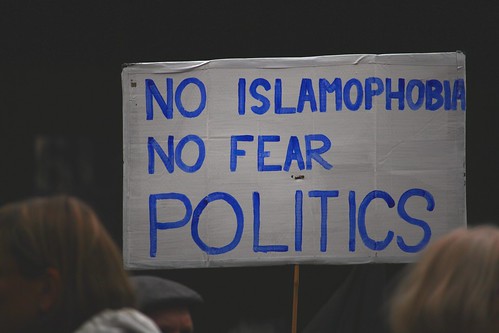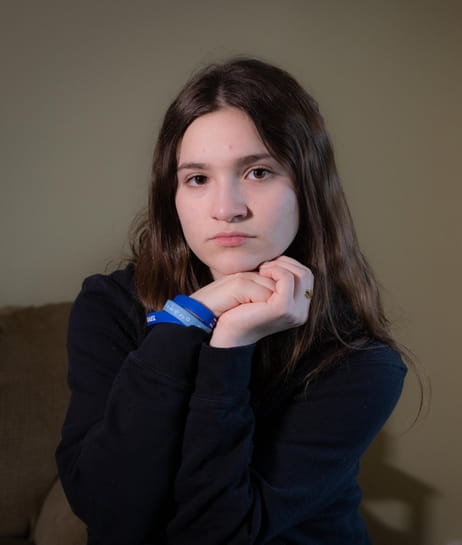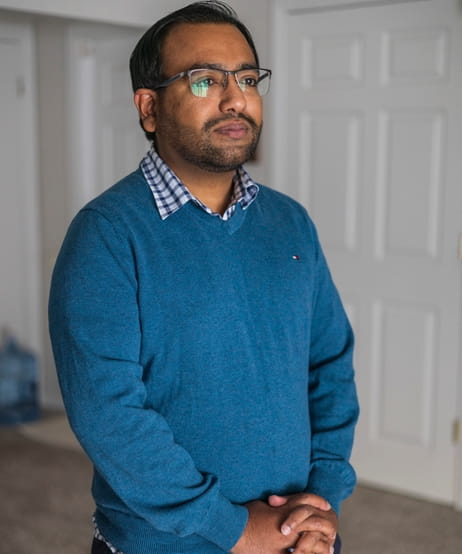Families worry kids are facing rise of antisemitism, Islamophobia since start of Israel-Hamas war
Islamophobia #Islamophobia

Syosset High School senior Rachel Abramowitz was walking down the school hallways earlier this month wearing a necklace bearing Hebrew letters and dog tags honoring Israeli hostages when she noticed some students eyeing her.
“I’ve never seen so many people staring at me,” Abramowitz, 17, said, adding that the incident came after reports of antisemitic graffiti at the school. “It hurt me personally. It’s giving me anxiety about going to school.”
Meanwhile, Toufique Harun’s two daughters, ages 10 and 7, have been returning to their Albertson home with concerning stories and questions, he said. The girls talk about Muslim friends being called terrorists and having their religious scarfs, called hijabs, pulled, he said. Harun has come to worry about their safety.
“I worry about that every day — 1,000%,” said Harun, who is Muslim. “Not only about bullying, I worry about their physical safety.”
Leaders in Long Island’s Jewish and Muslim communities say they worry that children of those faiths are facing an increase of prejudice and discrimination following the October start of the Israel-Hamas war. Facing discrimination is tough as an adult, but for young people, the experience can be more far more damaging. They’re more fragile emotionally and still forming their identity, experts say.
“For some children, this may be the first time they’ve confronted it. They may have been aware of it, but it’s not been in their face so much,” said Robin Gurwitch, a professor and psychologist at Duke University Medical Center in North Carolina.
Whether a young person is Jewish or Muslim, they have a hard time understanding that some people hate them, not for something they did, but because of their religion, Gurwitch said.
Discrimination can leave a young person feeling confused, fearful, angry and self-conscious, said Saida Abdi, an assistant professor at the University of Minnesota’s School of Social Work.
“They may withdraw. They may not want to go to school,” Abdi said. “It changes how they view the world. It can impact their capacity to feel secure and safe in the world.”
The Israel-Hamas war has seen widespread attention from newspapers to social media since its start Oct. 7, when Hamas attacked Israel, killing about 1,200 people and taking around 250 hostages. Israel’s military response has devastated parts of Gaza and cost more than 26,000 lives, according to the Gaza-based Ministry of Health, an agency in the Hamas-controlled government.
The local concerns come amid a spike in antisemitism and Islamophobia.
In the three months since the Oct. 7 massacre in Israel, U.S. antisemitic incidents have skyrocketed, reaching a total of 3,291 by Jan. 7, according to preliminary data from the Anti-Defamation League. This represents a 362% increase compared to the same period one year prior, which saw 712 incidents, the group said.
In the eight weeks from Oct. 7 to Dec. 2, the Council on American-Islamic Relations, the nation’s largest Muslim civil rights and advocacy organization, said it received 2,171 requests for help and reports of bias, which is a 172% increase over a similar two-month period the previous year.
Even if children aren’t plugged into the news, they often glean the gist of it, Abdi said. When they feel bullied or left out due to prejudice, the effects can impact their education, emotional development and health, she said.
“When children feel fearful and stressed, they can’t think about academia,” Abdi said.
Whether children face stares from classmates, a whispered remark behind their backs or some toxic face-to-face bullying, some young people can power through the difficulty — but most could use some help, said Isma Chaudhry, co-chair of the Islamic Center of Long Island in Westbury.
“An adult intervention — with wisdom, patience and empathy — that goes far,” Chaudhry said. Adults can remind children, “People are kind. People are there to protect you. You’re a kid.”
Chaudhry, of Manhasset, added that help needs to be a collaborative effort among parents, schools and the community. “These discussions have to happen in homes. Parents need to reach out to the schools, which need to be willing to collaborate.”
Rabbi Lyle Rothman of the Community Synagogue in Port Washington said young people are often the canaries in the coal mine regarding prejudice. Most adults know what is not acceptable in public, but young people sometimes lack the maturity, verbal filters and parental guidance to keep such thoughts to themselves, he said.
Leaders in the Island’s Jewish and Muslim communities say they’re seeing young people come forward with upsetting stories.
The Community Synagogue has been holding sessions for young people to air their concerns, Rothman said. Prayer itself can calm nerves, he said, noting the synagogue has added prayers for peace and healing in weekly Shabbat services.
Rothman said he’s been talking to several college students, some still in their teens, “experiencing antisemitic tropes and actions, whether on the part of their classmates or instructors — and they’re seeing silence from the administration.”
Numerous college campuses have experienced protests against Israel’s military campaign in Gaza, with students sometimes using hostile rhetoric toward Jews. Muslim leaders say they are also seeing an increase in anti-Muslim incidents.
Chaudhry said Muslim children are feeling stressed on two fronts — they see their families and other Muslim adults “in a state of frenzy and apprehension,” and they’re experiencing taunting at school and being excluded from play groups.
“We are making sure [at the Islamic Center] that we are providing a safe space for them to express themselves and have fun,” she said. “We are training teachers in our weekend school to identify kids who are quieter or have some change in behavior.”
In Long Island schools, swastikas recently have been discovered in schools in East Meadow, Syosset, Smithtown and Commack.
Long Island school leaders have issued strong statements condemning any expression of bias on their campuses and asserted that students caught doing so will face discipline, if not criminal charges.
They’re also adding programs aimed at teaching students about bias.
In the Lawrence school district, for example, students performed “The Diary of Anne Frank” as the high school play, created an art gallery exhibit on the Holocaust and had middle school students speak to Holocaust survivors, officials said.
“We strongly condemn any form of discrimination, whether that be antisemitism, Islamophobia, or hate in any of its manifestations,” Superintendent Ann Pedersen said. “We believe it is critical that we educate about all prejudice, and we are very proud of the diversity that the Lawrence community represents.”
In the Syosset school district, officials pointed to programs aimed at combating bias, such as a bullying prevention program in elementary school, and the Patience, Respect, Integrity, Dignity, and Empathy (PRIDE) program at the secondary level.
The Syosset school board recently established an Anti-Bias Task Force to develop ideas and recommendations for the board to consider that will reinforce tolerance and inclusivity, district spokeswoman Philomena Hefferon said.
New York City school officials recently announced that middle and high schools will teach about antisemitism and Islamophobia, following criticism that they were doing too little to address the Israel-Hamas war.
Mark Abramowitz said he never expected his daughter, Rachel, would face antisemitism on Long Island when the family moved here about 15 years ago. But neither did he imagine that their synagogue, Midway Jewish Center in Syosset, would need to hire security guards.
In advising his daughter, Abramowitz said he’s recommended she always keep aware of her surroundings, have her phone handy and inform school officials if something happens.
“Obviously I want to make sure she’s OK,” he said, adding that the family speaks of “paths forward, ways to educate people with facts and values. … Doing the right thing in our community.”
Being the victim of bias can impact a child’s relationship with their religion. Some young people choose not to share their religion outside their own religious community, Gurwitch said.
“I’ve heard stories of children taking off their yarmulke when they come out of a synagogue or maybe put the Star of David inside their shirt,” Gurwitch said. “Others, however, say, ‘I’m going to stand up. That’s not right.'”
In Rachel’s case, she’s doubled down on her Jewishness. She said she still wears her necklace and dog tags outside her shirt. She’s joined an advisory group on bias in school and has spoken out against antisemitism at two school board meetings, including one where she said she saw a man staring at her “with a look of pure hate.”
“I felt it’s my duty to respond and make a change in my community,” she said.
Considering the current climate, Gurwitch suggested that parents start the conversation and not wait for their kids to mention something.
Harun, the Albertson father of two, said he and his wife are pretty upfront with the girls about what’s going on, though they leave out some of the more intense details. He requested the girls not be named, out of safety concerns.
His 7-year-old recently broached the topic after seeing video of the Israel-Hamas war. She focused on a Palestinian child that had been hurt, asking why she got hurt.
“There’s a war going on over there,” his wife told her. “A lot of people are getting hurt.”
Harun finds hope in the fact that his 10-year-old’s friends include a mix of Jewish, Muslim, Hindu and Christian kids.
“Thank goodness she has a good group of friends,” he said. “Once you connect with people at a human level, it breaks down every one of these stereotypes. … It’s magic.”
Syosset High School senior Rachel Abramowitz was walking down the school hallways earlier this month wearing a necklace bearing Hebrew letters and dog tags honoring Israeli hostages when she noticed some students eyeing her.
“I’ve never seen so many people staring at me,” Abramowitz, 17, said, adding that the incident came after reports of antisemitic graffiti at the school. “It hurt me personally. It’s giving me anxiety about going to school.”
Meanwhile, Toufique Harun’s two daughters, ages 10 and 7, have been returning to their Albertson home with concerning stories and questions, he said. The girls talk about Muslim friends being called terrorists and having their religious scarfs, called hijabs, pulled, he said. Harun has come to worry about their safety.
“I worry about that every day — 1,000%,” said Harun, who is Muslim. “Not only about bullying, I worry about their physical safety.”
Leaders in Long Island’s Jewish and Muslim communities say they worry that children of those faiths are facing an increase of prejudice and discrimination following the October start of the Israel-Hamas war. Facing discrimination is tough as an adult, but for young people, the experience can be more far more damaging. They’re more fragile emotionally and still forming their identity, experts say.
“For some children, this may be the first time they’ve confronted it. They may have been aware of it, but it’s not been in their face so much,” said Robin Gurwitch, a professor and psychologist at Duke University Medical Center in North Carolina.
Whether a young person is Jewish or Muslim, they have a hard time understanding that some people hate them, not for something they did, but because of their religion, Gurwitch said.
Discrimination can leave a young person feeling confused, fearful, angry and self-conscious, said Saida Abdi, an assistant professor at the University of Minnesota’s School of Social Work.
“They may withdraw. They may not want to go to school,” Abdi said. “It changes how they view the world. It can impact their capacity to feel secure and safe in the world.”
The Israel-Hamas war has seen widespread attention from newspapers to social media since its start Oct. 7, when Hamas attacked Israel, killing about 1,200 people and taking around 250 hostages. Israel’s military response has devastated parts of Gaza and cost more than 26,000 lives, according to the Gaza-based Ministry of Health, an agency in the Hamas-controlled government.
The local concerns come amid a spike in antisemitism and Islamophobia.
In the three months since the Oct. 7 massacre in Israel, U.S. antisemitic incidents have skyrocketed, reaching a total of 3,291 by Jan. 7, according to preliminary data from the Anti-Defamation League. This represents a 362% increase compared to the same period one year prior, which saw 712 incidents, the group said.
In the eight weeks from Oct. 7 to Dec. 2, the Council on American-Islamic Relations, the nation’s largest Muslim civil rights and advocacy organization, said it received 2,171 requests for help and reports of bias, which is a 172% increase over a similar two-month period the previous year.
Even if children aren’t plugged into the news, they often glean the gist of it, Abdi said. When they feel bullied or left out due to prejudice, the effects can impact their education, emotional development and health, she said.
“When children feel fearful and stressed, they can’t think about academia,” Abdi said.
How adults can help kids fight bias
Whether children face stares from classmates, a whispered remark behind their backs or some toxic face-to-face bullying, some young people can power through the difficulty — but most could use some help, said Isma Chaudhry, co-chair of the Islamic Center of Long Island in Westbury.
An adult intervention — with wisdom, patience and empathy — that goes far.
—Isma Chaudhry, co-chair of the Islamic Center of Long Island
“An adult intervention — with wisdom, patience and empathy — that goes far,” Chaudhry said. Adults can remind children, “People are kind. People are there to protect you. You’re a kid.”
Chaudhry, of Manhasset, added that help needs to be a collaborative effort among parents, schools and the community. “These discussions have to happen in homes. Parents need to reach out to the schools, which need to be willing to collaborate.”
Rabbi Lyle Rothman of the Community Synagogue in Port Washington said young people are often the canaries in the coal mine regarding prejudice. Most adults know what is not acceptable in public, but young people sometimes lack the maturity, verbal filters and parental guidance to keep such thoughts to themselves, he said.
Leaders in the Island’s Jewish and Muslim communities say they’re seeing young people come forward with upsetting stories.
The Community Synagogue has been holding sessions for young people to air their concerns, Rothman said. Prayer itself can calm nerves, he said, noting the synagogue has added prayers for peace and healing in weekly Shabbat services.
Rothman said he’s been talking to several college students, some still in their teens, “experiencing antisemitic tropes and actions, whether on the part of their classmates or instructors — and they’re seeing silence from the administration.”
Numerous college campuses have experienced protests against Israel’s military campaign in Gaza, with students sometimes using hostile rhetoric toward Jews. Muslim leaders say they are also seeing an increase in anti-Muslim incidents.
Chaudhry said Muslim children are feeling stressed on two fronts — they see their families and other Muslim adults “in a state of frenzy and apprehension,” and they’re experiencing taunting at school and being excluded from play groups.
“We are making sure [at the Islamic Center] that we are providing a safe space for them to express themselves and have fun,” she said. “We are training teachers in our weekend school to identify kids who are quieter or have some change in behavior.”
In Long Island schools, swastikas recently have been discovered in schools in East Meadow, Syosset, Smithtown and Commack.
Long Island school leaders have issued strong statements condemning any expression of bias on their campuses and asserted that students caught doing so will face discipline, if not criminal charges.
They’re also adding programs aimed at teaching students about bias.
We strongly condemn any form of discrimination, whether that be antisemitism, Islamophobia, or hate in any of its manifestations.
—Lawrence Schools Superintendent Ann Pedersen
In the Lawrence school district, for example, students performed “The Diary of Anne Frank” as the high school play, created an art gallery exhibit on the Holocaust and had middle school students speak to Holocaust survivors, officials said.
“We strongly condemn any form of discrimination, whether that be antisemitism, Islamophobia, or hate in any of its manifestations,” Superintendent Ann Pedersen said. “We believe it is critical that we educate about all prejudice, and we are very proud of the diversity that the Lawrence community represents.”
In the Syosset school district, officials pointed to programs aimed at combating bias, such as a bullying prevention program in elementary school, and the Patience, Respect, Integrity, Dignity, and Empathy (PRIDE) program at the secondary level.
The Syosset school board recently established an Anti-Bias Task Force to develop ideas and recommendations for the board to consider that will reinforce tolerance and inclusivity, district spokeswoman Philomena Hefferon said.
New York City school officials recently announced that middle and high schools will teach about antisemitism and Islamophobia, following criticism that they were doing too little to address the Israel-Hamas war.
‘Paths forward’ for young people
Mark Abramowitz said he never expected his daughter, Rachel, would face antisemitism on Long Island when the family moved here about 15 years ago. But neither did he imagine that their synagogue, Midway Jewish Center in Syosset, would need to hire security guards.
In advising his daughter, Abramowitz said he’s recommended she always keep aware of her surroundings, have her phone handy and inform school officials if something happens.
“Obviously I want to make sure she’s OK,” he said, adding that the family speaks of “paths forward, ways to educate people with facts and values. … Doing the right thing in our community.”
Being the victim of bias can impact a child’s relationship with their religion. Some young people choose not to share their religion outside their own religious community, Gurwitch said.
“I’ve heard stories of children taking off their yarmulke when they come out of a synagogue or maybe put the Star of David inside their shirt,” Gurwitch said. “Others, however, say, ‘I’m going to stand up. That’s not right.'”

I felt it’s my duty to respond and make a change in my community.
— Syosset High School senior Rachel Abramowitz
Credit: Newsday/J. Conrad Williams Jr.
In Rachel’s case, she’s doubled down on her Jewishness. She said she still wears her necklace and dog tags outside her shirt. She’s joined an advisory group on bias in school and has spoken out against antisemitism at two school board meetings, including one where she said she saw a man staring at her “with a look of pure hate.”
“I felt it’s my duty to respond and make a change in my community,” she said.
Considering the current climate, Gurwitch suggested that parents start the conversation and not wait for their kids to mention something.

Once you connect with people at a human level, it breaks down every one of these stereotypes. … It’s magic.
—Toufique Harun, Albertson father of two daughters
Credit: Newsday/ Alejandra Villa Loarca
Harun, the Albertson father of two, said he and his wife are pretty upfront with the girls about what’s going on, though they leave out some of the more intense details. He requested the girls not be named, out of safety concerns.
His 7-year-old recently broached the topic after seeing video of the Israel-Hamas war. She focused on a Palestinian child that had been hurt, asking why she got hurt.
“There’s a war going on over there,” his wife told her. “A lot of people are getting hurt.”
Harun finds hope in the fact that his 10-year-old’s friends include a mix of Jewish, Muslim, Hindu and Christian kids.
“Thank goodness she has a good group of friends,” he said. “Once you connect with people at a human level, it breaks down every one of these stereotypes. … It’s magic.”
How to talk to children about antisemitism, Islamophobia and hate crimes
Start the conversation. Talk about the events with your children/teens. Provide a level of information and discussion that is appropriate for your child’s developmental level.
What does your child already know? Start by asking what your children/teens already have heard about the incident and the aftermath. As your children talk, listen for misinformation, misconceptions and underlying fears or concerns.
Gently correct inaccurate information. Take time to provide the correct information in language your children/teens can understand.
Be patient. In times of stress, children/teens may have more trouble with their behavior, concentration and attention. Even if they may not openly seek your understanding or support, they will want this.
Promote your family values and beliefs. As you begin conversations, recognize that this is an important opportunity to instill values and beliefs about respect, tolerance and diversity.
SOURCE: The National Child Traumatic Stress Network

Craig Schneider is a Long Island native and Stony Brook University alumnus. He joined Newsday as a general assignment reporter in January 2018 after 20 years at the Atlanta Journal-Constitution.